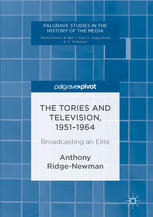

Most ebook files are in PDF format, so you can easily read them using various software such as Foxit Reader or directly on the Google Chrome browser.
Some ebook files are released by publishers in other formats such as .awz, .mobi, .epub, .fb2, etc. You may need to install specific software to read these formats on mobile/PC, such as Calibre.
Please read the tutorial at this link: https://ebookbell.com/faq
We offer FREE conversion to the popular formats you request; however, this may take some time. Therefore, right after payment, please email us, and we will try to provide the service as quickly as possible.
For some exceptional file formats or broken links (if any), please refrain from opening any disputes. Instead, email us first, and we will try to assist within a maximum of 6 hours.
EbookBell Team

4.7
66 reviewsThis book explores the role of television in the 1950s and early 1960s, with a focus on the relationship between Tories and TV. The early 1950s were characterized by recovery from war and high politics. Television was a new medium that eventually came to dominate mass media and political culture. But what impact did this transition have on political organization and elite power structures? Winston Churchill avoided it; Anthony Eden wanted to control it; Harold Macmillan tried to master it; and Alec Douglas-Home was not Prime Minister long enough to fully utilize it. The Conservative Party’s relationship with the new medium of television is a topic rich with scholarly questions and interesting quirks that were characteristic of the period. This exploration examines the changing dynamics between politics and the media, at grassroots and elite levels. Through analysing rich and diverse source materials from the Conservative Party Archive, Anthony Ridge-Newman takes a case study approach to comparing the impact of television at different points in the party’s history. In mapping changes across a thirteen year period of continual Conservative governance, this book argues that the advent of television contributed to the party’s transition from a membership-focused party to a television-centric professionalized elite.